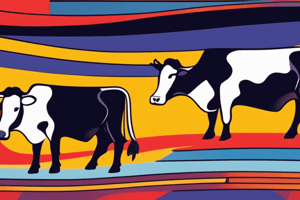Podcast
Questions and Answers
Match the following terms related to drug use and effects:
Match the following terms related to drug use and effects:
Substance abuse = c. Any unnecessary or improper use of chemical substances for non-medical purposes. Illegal drugs = e. Chemical substances that people of any age may not lawfully manufacture, possess, buy, or sell. Psychoactive drugs = a. Chemicals that affect the central nervous system and alter activity in the brain. Designer drug = b. A synthetic drug that is made to imitate the effects of hallucinogens and other drugs.
Match the following terms related to drug interactions:
Match the following terms related to drug interactions:
Additive interaction = b. Occurs when medicines work together in a positive way. Antagonistic interaction = d. Occurs when the effect of one medicine is canceled or reduced when taken with another medicine. Synergistic effect = e. The interaction of two or more medicines that results in a greater effect than when the medicines are taken alone. Medicine misuse = c. Using medicine in ways other than the intended use.
Match the following drug-related terms:
Match the following drug-related terms:
Overdose = g. A strong, sometimes fatal reaction to taking a large amount of a drug. Paranoia = d. An irrational suspiciousness or distrust of others. Illicit drug use = f. The use of sale of any substance that is illegal or otherwise not permitted. Opiates = b. Drugs like those derived from the opium plant that are obtainable only by prescription and are used to relieve pain.
Match the following drug categories:
Match the following drug categories:
Match the medication types with their definitions:
Match the medication types with their definitions:
Match the following drug effects with their descriptions:
Match the following drug effects with their descriptions:
Flashcards
Illicit drug use
Illicit drug use
The use of sale of any substance that is illegal or otherwise not permitted.
Psychoactive drugs
Psychoactive drugs
Chemicals that affect the central nervous system and alter activity in the brain.
Designer drug
Designer drug
A synthetic drug that is made to imitate the effects of hallucinogens and other drugs.
Paranoia
Paranoia
Signup and view all the flashcards
Substance abuse
Substance abuse
Signup and view all the flashcards
Opiates
Opiates
Signup and view all the flashcards
Inhalants
Inhalants
Signup and view all the flashcards
Hallucinogens
Hallucinogens
Signup and view all the flashcards
Study Notes
Chapter 19/22 Vocabulary Quiz - Study Notes
-
Question 1 (35 points): Match the following terms and definitions.
- Substance abuse: Any unnecessary or improper use of chemical substances for non-medical purposes.
- Illegal drugs: Chemical substances that people of any age may not lawfully manufacture, possess, buy, or sell.
- Illicit drug use: Any unnecessary or improper use of chemical substances for non-medical purposes
- Overdose: A strong, sometimes fatal reaction to taking a large amount of a drug.
- Paranoia: An irrational suspiciousness or distrust of others.
- Psychoactive drugs: Chemicals that affect the central nervous system and alter activity in the brain.
- Designer drug: A synthetic drug that is made to imitate the effects of hallucinogens and other drugs.
-
Question 2 (15 points): Match the following terms and definitions.
- Inhalants: Substances whose fumes are sniffed or inhaled to give a mind-altering effect.
- Opiates: Drugs like those derived from the opium plant that are obtainable only by prescription and are used to relieve pain.
- Hallucinogens: Drugs that alter moods, thoughts, and sense perceptions including vision, hearing, smell, and touch.
-
Question 3 (35 points): Match the following terms and definitions.
- Additive interaction: Occurs when medicines work together in a positive way, resulting in a greater effect than when the medicines are taken alone
- Antagonistic interaction: Occurs when the effect of one medicine is canceled or reduced when taken with another medicine
- Synergistic effect: The interaction of two or more medicines that results in a greater effect than when the medicines are taken alone.
- Prescription medicines: Medicines that cannot be used without the written approval of a licensed physician or nurse practitioner.
- Over the counter (OTC): Medicines you can buy without a prescription.
- Medicine misuse: Using medicine in ways other than the intended use (e.g., taking the medicine longer or shorter than prescribed)
- Medicine abuse: Intentionally taking medicines for non-medical reasons.
Studying That Suits You
Use AI to generate personalized quizzes and flashcards to suit your learning preferences.




